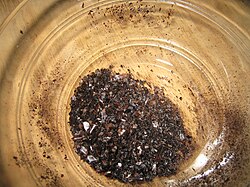Dried lime, also known as: black lime;[1] noomi basra (Iraq);[2] limoo amani (Iran); and loomi (Oman),[3] is a lime that has lost its water content, usually after having spent a majority of its drying time in the sun. They are used whole, sliced, or ground, as a spice in Middle Eastern dishes. Originating in the Persian Gulf[4][5] – hence the Iranian name limoo amani and the Iraqi name noomi basra ("lemon from Basra") – dried limes are popular in cookery across the Middle East.
 | |
| Type | Dried food |
|---|---|
| Place of origin | Oman, Iraq and Iran |
| Region or state | Middle East |
| Associated cuisine | Middle Eastern cuisine |

Uses
editDried limes are used to add a sour depth and flavor to dishes, through a process known as souring.[6] In Persian cuisine, they are used to flavor stews and soups.[7] Across the Middle East, they are used with fish, whereas in Iraq, they are added to almost all dishes and forms of stuffing.[3] They can also be used to make dried lime tea. Powdered dried lime is also used as an ingredient in Middle Eastern-style baharat (a spice mixture). It is a traditional ingredient in the cuisines of Saudi Arabia, Iraq, and other countries of the Persian Gulf.
Flavor
editDried limes are strongly flavored. They taste sour and citrusy like fresh limes, but have an added earthy and somewhat smoky taste and lack the sweetness of fresh limes. Because they are preserved, they also have a slightly bitter, fermented flavor, but the bitter accents are mainly concentrated in the lime's outer skin and seeds.
Tea
editDried lime tea is a type of herbal tea made from dried limes and is a popular beverage in Iraq where it is used to aid indigestion, diarrhea, and nausea.
See also
editReferences
edit- ^ Mallos, Tess (2007). Middle Eastern Cooking. VT, USA: Periplus Editions. p. 16. ISBN 9780794650346.
- ^ Ayelet's Comfort (2015). "What is Noomi Basra?". Archived from the original on 2 December 2015. Retrieved 10 October 2015.
- ^ a b Basan, Ghillie (2007). Middle Eastern Kitchen. NY, USA: Hippocrene Books Inc. p. 78. ISBN 9780781811903.
- ^ Billock, Jennifer (2017-11-15). "Heard of Black Lime? Here's How To Use It". tales of the cocktail. Archived from the original on 2018-08-24. Retrieved 23 August 2018.
- ^ GERSHENSON, GABRIELLA (27 July 2011). "SOUR POWER: COOKING WITH DRIED LIMES". saveur. Retrieved 23 August 2018.
- ^ Butcher, Sally (2012). "Legumes and Pulses". Veggiestan: A Vegetable Lover's Tour of the Middle East. London, UK: Pavilion Books. ISBN 9781909108226.
- ^ Shafia, Louisa (2013-04-16). The New Persian Kitchen. CA, USA: Ten Speed Press. p. 10. ISBN 9781607743576.
External links
edit- Spice Pages: Lime
- Black Lemons Archived 2015-09-06 at the Wayback Machine